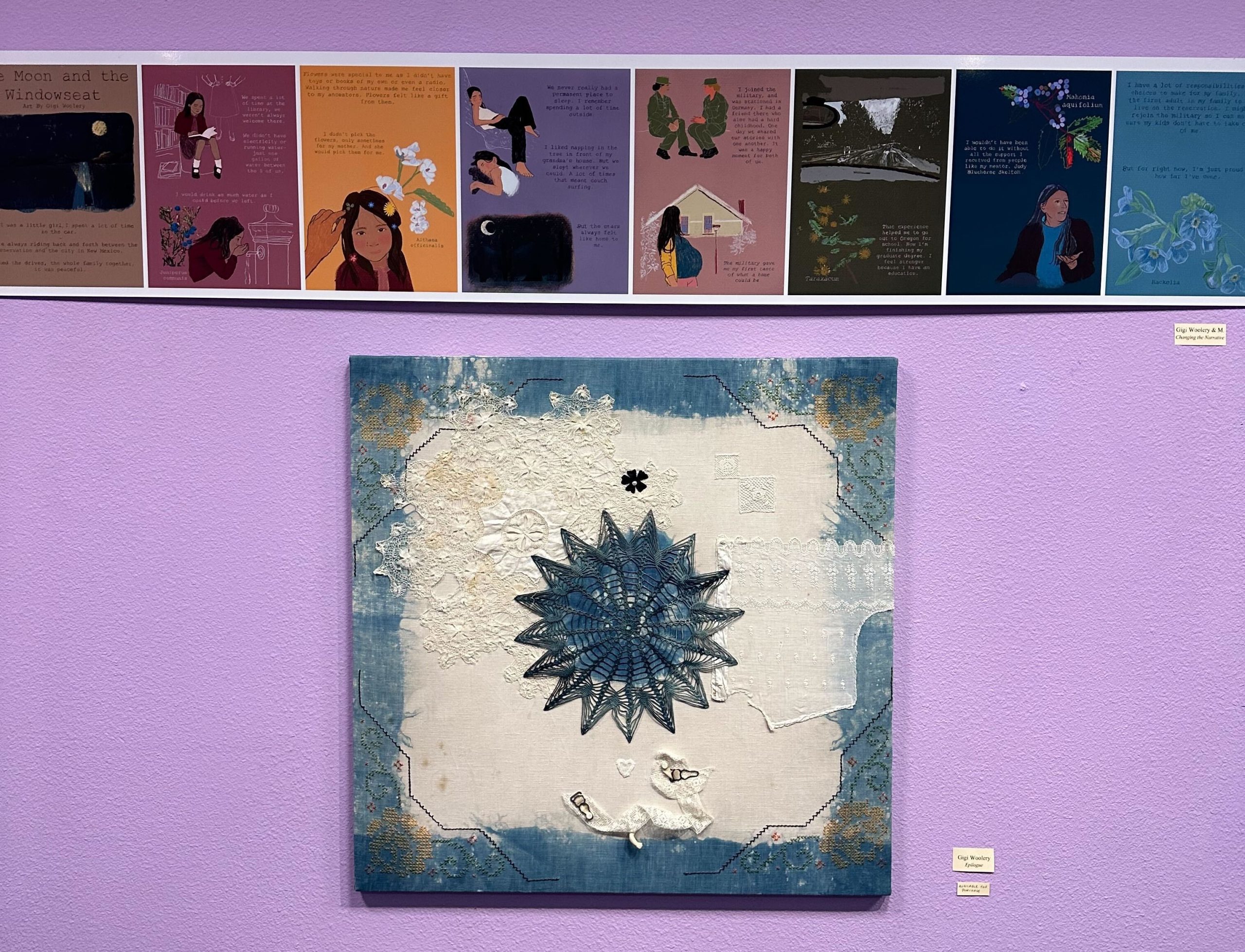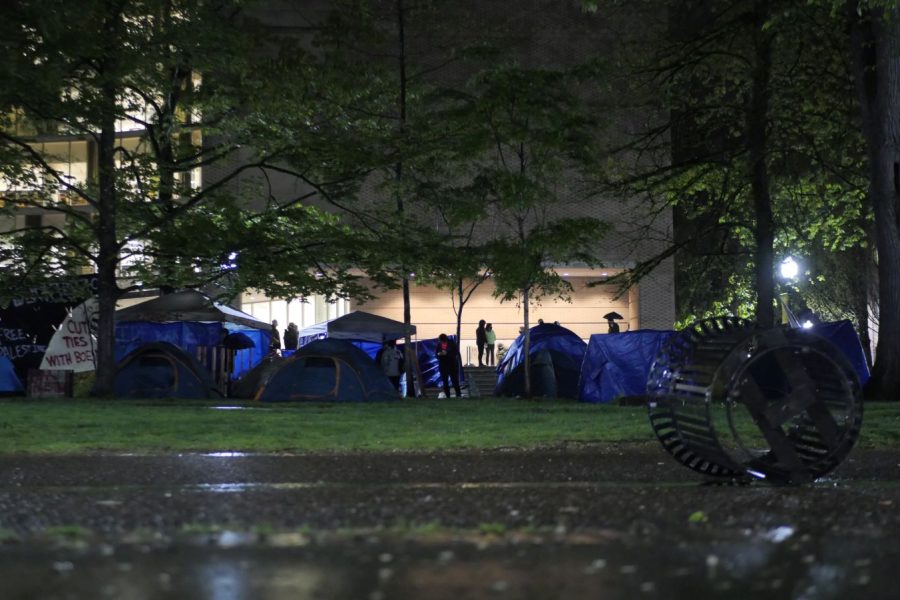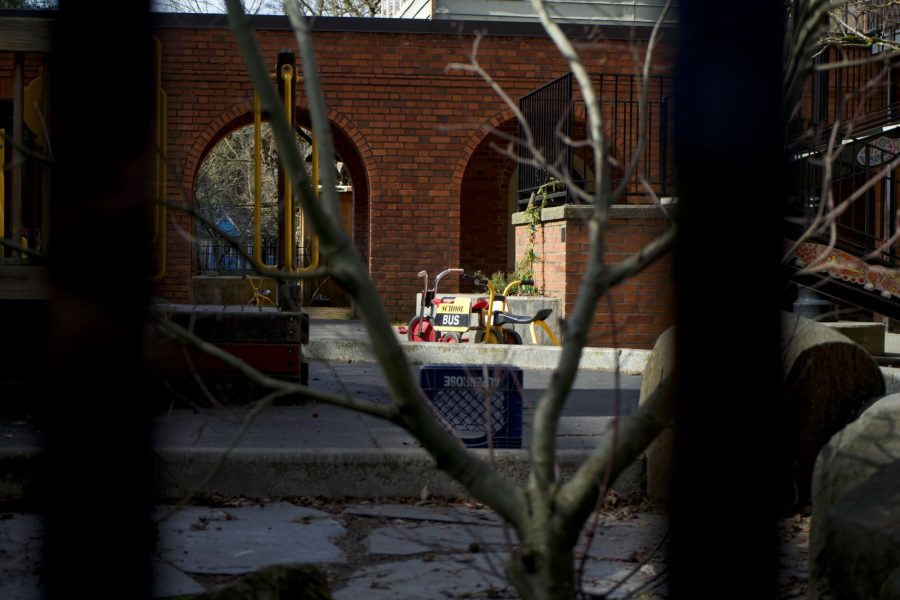Housing insecurity continues to be one of Portland’s most pressing issues. Not only does the structural change required to alleviate this crisis remain elusive, but those experiencing houselensess continue to face social stigma and a lack of compassion from broader society.
Tucked away in the Lloyd Center, far past the endless walkways, is an art exhibition called Epilogue: Changing the Narrative aimed to illuminate these issues. It was part of research week at Portland State, and was led by Dr. Kacy McKinney, a PSU professor and visual artist.
This exhibition is the second installment of last year’s Changing the Narrative project, which McKinney described as a “collaborative, community and arts-based research project that seeks to change the ways that we talk, think and teach about houselessness and poverty.”
Epilogue continued this original research project with eighteen new works which shared personal encounters with houselessness. The pieces vary across various mediums, including pottery, paper craft, textile art and a heavy emphasis on cartoon art. The art featured serves to carve out a path of accessibility and care within research about houselessness.
At the exhibition, research participants welcomed and opened the space to the public, happily engaging in meaningful conversations and willing to share even the most intimate stories.
While the project celebrates local artists, the show’s content is relevant far beyond Portland alone. “If you look at the stories, some of them aren’t even about Portland at all,” McKinney said. “Some of them aren’t even about PSU at all. It was never meant to be just a study of PSU.”
“It was meant to understand a range of experiences of people who are college students, and even college students experiencing it [housing insecurity] before they were ever college students,” McKinney said. “And I think that’s an interesting thing. It’s like, how do people get here? What do they go through?”
The work of artist and PSU alumni Fran Powers was featured in the exhibition. Powers identifies as a queer, feminist, abstract artist and likes to talk about justice and access. At the exhibition, Powers shared what they went through, their life story and experiences.
“Have you ever had a conversation with a professor where you’re just like, ‘I have been in tears and I haven’t been able to use my words, but it is because I am stressed and hungry and afraid of failing?’” Powers said. “This is about equipping every person in the university with the skills to support students.”
According to McKinney, maintaining a strictly impersonal distance between faculty, staff and students can pose a barrier when it comes to being compassionate and understanding in a university setting. “We’re so often distancing ourselves and we’re taught to distance ourselves,” McKinney said. “And we teach our research assistants to distance themself and to try to be objective, which, as feminist scholars, we don’t actually believe in objectivity, right?”
“We’re all carrying our own baggage,” McKinney said. “We all have our own lens. We all bring our own background. We all have our own ways of seeing the world and knowing the world.”
For Powers, art itself is an opportunity for real, vulnerable connection in the world of academia. Powers spoke in support of the abundance of public art available to interact with at PSU and advocates for the integration and prioritization of art on campus—especially in places that are explicitly for students’ well-being—such as the Center for Student Health and Counseling and the Native American Student and Community Center.
“You know, I think that this just shows you how much art can happen through different types of departments, whether it’s public health, urban studies., etc., and you can totally take one of those and [then, with art], see authentic, diverse student experiences,” Powers said.
Epilogue achieved this goal for the city of Portland, creating an accessible art-centric space which permitted people to share their stories in the formats that suited them. “For me, [that’s why] Epilogue is particularly interesting and rare in that it’s like… let’s not just write about it with words, but let’s actually create art from the perspective and from the medium that makes the most sense to [those in the research]…” Powers said. “We have all of these different creative expressions of impact.”
Epilogue is rooted in collaboration, people and art. “It’s a totally unique approach to doing long-term research and coming back to the table after research has been done,” McKinney said.
“So often we do a project, we have participants, it ends and that’s the last event everyone sees of each other, but because the first project was so collaborative, it made so much sense to bring everyone back, to invite everyone back and be like, ‘what does it mean?’” McKinney said. “And ‘how are you using it?’ And ‘how did it feel?’”
For many students at PSU, projects such as these allow for community-building and intellectual growth. “Me going to Portland State University was for this,” Powers said. “It wasn’t about the degrees. I couldn’t be more proud to be a part of something. This really goes to show how powerful the community of PSU can be.”
While the exhibition closed on May 11, the book Epilogue: Changing the Narrative can be taught and made available by contacting McKinney.






